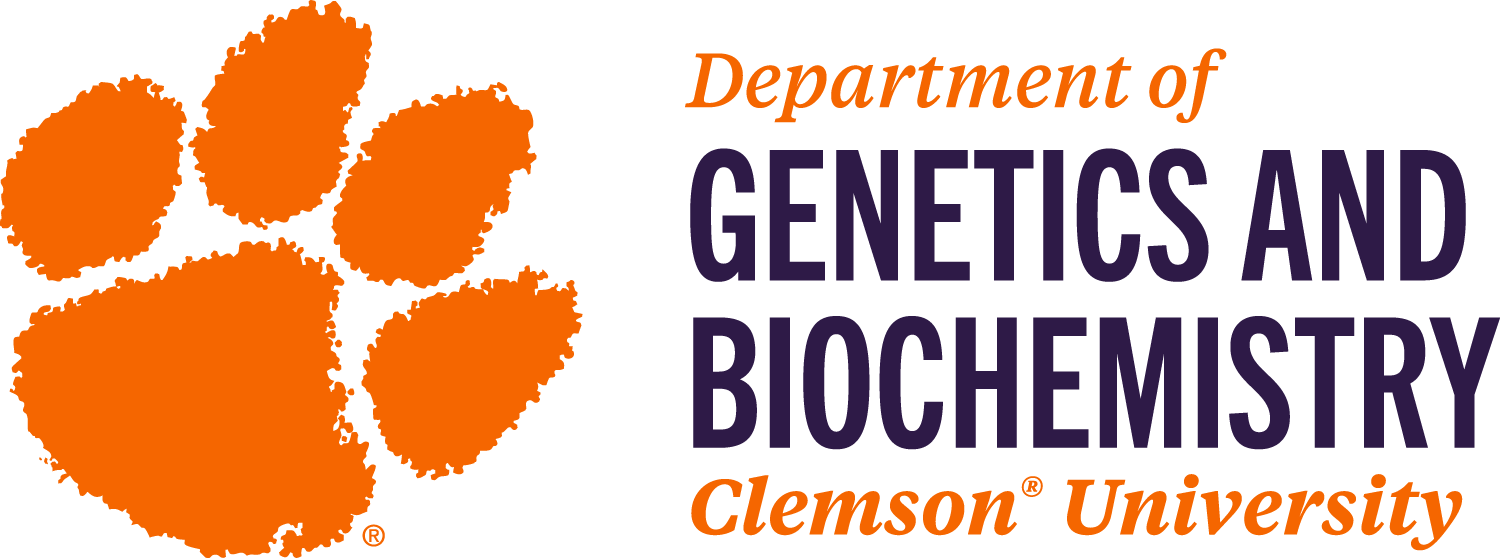
Graduate Programs
The Department of Genetics and Biochemistry offers separate programs in genetics or biochemistry and molecular biology leading to the Master of Science and Doctor of Philosophy degrees. Enrollment is open to students with baccalaureate degrees in agricultural, biological, physical sciences or engineering. Entering students must have excellent academic records in biological, mathematical, or physical sciences.
Overview of Programs
Graduate research in both genetics or biochemistry and molecular biology programs includes human, animal, plant and microbial biochemistry, and genetics, as well as molecular and biometrical genetics. Core courses for both programs include advanced discipline specific courses, as well as courses in methods, proteomics and genomics, and professional development. Additional courses are selected from the biochemistry/genetics curriculum, special offerings and supporting departments’ course offerings to provide the academic and technical competencies needed to enhance the research focus of your program.
If you are accepted as a teaching assistant, you will select an adviser and begin your thesis research after a one-semester, three-laboratory rotation. If you are accepted as a research assistant, you will forgo the rotation period but must be accepted by a research adviser before admission. An advisery committee, selected by you and your adviser, determines your course work requirements, keeps track of your progress in the classroom and laboratory and administers the final examinations. Although course requirements vary for each division, breadth and depth of preparation are expected of each candidate in the chosen discipline.
You will be kept abreast of recent developments in genetics, biochemistry and molecular biology through seminars, colloquia, journal clubs and special courses. Much of your education will be received informally through frequent discussions with faculty and other students, both within and outside the department. You are expected to present research results at regional and national scientific meetings, publish in recognized journals, and submit grant proposals in collaboration with faculty members.
The Department of Genetics and Biochemistry collaborates with several other university departments and colleges in teaching and research, including the departments of bioengineering, chemistry, computer science, mathematics, physics, textiles, animal and veterinary sciences, biological sciences, and entomology.
Admission Recommendation
In addition to the above required courses, it is highly recommended that students enrolling in the program have completed at least one semester of genetics, biochemistry, cell biology and calculus.
Admission Deadlines
Fall admittance deadlines are:
- June 1 of the enrollment year for M.S. programs.
- Dec. 1 of the previous year for Ph.D. programs.
Spring admittance deadlines are:
- Oct. 15 for M.S. programs.
- Sept. 1 for Ph.D. programs.
Degree Requirements
The Ph.D. degree in genetics or biochemistry and molecular biology requires 15 hours of coursework. Additional hours required for full-time status are fulfilled by doctoral research. At least 18 hours of doctoral research are required for the Ph.D. For the M.S., a total of 24 hours of coursework is required, with an additional minimum of six hours of research. In addition, all students must register for seminar each semester of enrollment.
Program Curriculums
The curriculums for programs in the Department of Genetics and Biochemistry are outlined below. For questions, contact the department directly.
M.S in Genetics or Biochemistry and Molecular Biology
First Year (Fall)
- Advanced Biochemistry BCHM 8140 (four hours).
- GEN/BCHM 8050 (three hours).
- GEN/BCHM 8250 (one hour).
First Year (Spring)
- Advanced Genetics GEN 8140 (four hours).
- Science Elective (three hours).
- Science Elective (one–three hours).
- GEN/BCHM 8250 (one hour).
Second Year (Fall)
- Selected elective course (three hours).
- Seminar GEN/BCHM 8250 (one hour).
Second Year (Spring)
- Selected elective course (three hours).
- Seminar GEN/BCHM 8510 (in last term, in lieu of 8250; one hour).
Total hours: 30–33 hours (24 as coursework). Note that additional hours required for full time status are fulfilled by GEN/BIOCH 8910 for M.S. students.
Ph.D. in Genetics or Biochemistry and Molecular Biology
First Year (Fall)
- Issues in Research GEN/BCHM 8050 (3,0).
- Advanced Biochemistry BCHM 8140 (4,0).
- Seminar GEN/BCHM 8250 (1,0).
- Research GEN/BCHM 9910 (1,0).
First Year (Spring)
- Advanced Genetics GEN 8140 (4,0).
- Seminar GEN/BCHM 8250 (1,0).
- Research GEN/BCHM 9910 (4,0).
First Year (Summer)
- GEN/BCHM 9910 (6,0).
Second Year (Fall)
- Seminar GEN/BCHM 8250 (1,0).
- Elective course (4,0).
- Research GEN/BCHM 9910 (X,0) — up to nine credits total.
Second Year (Spring)
- Seminar GEN/BCHM 8250 (1,0).
- Research GEN/BCHM 9910 (X,0) — up to nine credits total.
Second Year (Summer)
- GEN/BCHM 9910 (6,0).
Future Years
Subsequent fall/spring semesters:
- Seminar GEN/BCHM 8250 (or GEN/BCHM 8510 in last semester) each semester (1,0).
- Research GEN/BCHM 9910 (X,0) — up to nine credits total
Summer Semesters
You must complete four additional credits of coursework. This can either be a four-credit course, a three-credit course and one-credit course such as journal club, or two two-credit courses spread over the fall and spring semesters of the second year. Elective course selection needs to be approved by your advisory committee.
- Research GEN/BCHM 9910 (6,0).
Seminars
Beginning in the second year of enrollment, all Ph.D. students are required to present research in progress seminars as part of the GEN 8250 requirements. Pre-doctoral students will present 15–20 minute seminars; doctoral candidates will be given a full hour to present.
Comprehensive Examinations and Defense
Successful completion of written and oral comprehensive examinations will admit the doctoral student to candidacy for the Ph.D. degree. Comprehensive examinations are administered following the end of the second year, but before the end of the fifth semester of the program.
The graduate student must prepare a Ph.D. or M.S. dissertation describing the original research accomplished and the results obtained. When the dissertation has met the approval of the students’ major adviser, the student will present his or her research before the public and defend the research before the advisory committee and all faculty who wish to attend in a private oral examination.
